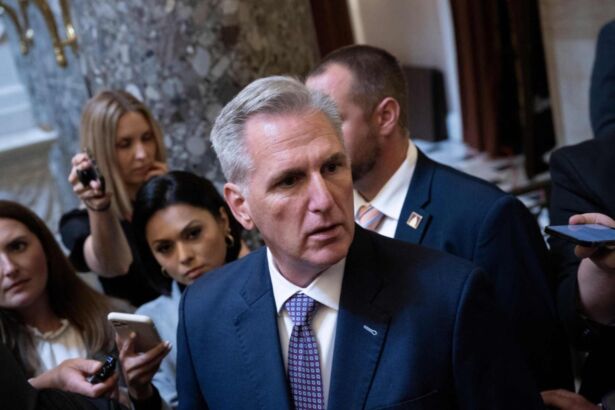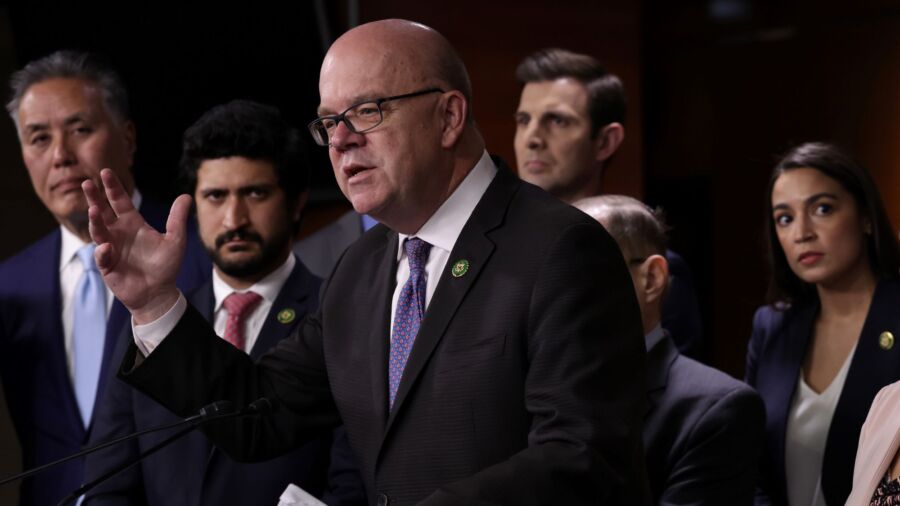A short-term continuing resolution (CR) aimed at averting a government shutdown while allowing Congress an additional month to come to an agreement on spending has been cleared for consideration by the House of Representatives.
The House Rules Committee voted 9-3 along party lines to pass the rule for consideration of H.R. 5525, Continuing Appropriations and Border Security Enhancement Act, 2024, which had been proposed by a coalition of Republicans from the House Freedom and Main Street Caucuses.
The bill would extend government funding for 31 days beyond the end of the fiscal year on Sept. 30 while cutting most non-defense discretionary spending by just over 8 percent. Department of Defense and Veterans Affairs spending would continue at current levels.
Designers of the legislation included large portions of H.R. 2, Secure the Border Act, which passed the House in May but has not been taken up in the Senate.
“First and foremost, I want to reiterate that the package before you is focused on securing the southern border,” Rep. Stephanie Bice (R-Okla.), a sponsor of the continuing resolution, told the committee.
“I am pleased that this bill includes nearly the entirety of H.R. 2, plus nine appropriations limitation provisions to block the [Secretary Alejandro] Mayorkas DHS from releasing aliens into the interior, while they await a hearing,” she said.
H.R. 2 would limit the Department of Homeland Security (DHS) in providing parole to illegal immigrants, allowing them to temporarily enter the United States.
“When you fail to enforce the nation’s immigration laws, more will come,” Rep. David Joyce (R-Ohio) told the committee. “This bill provides a solution to keep the government open, secure the border, and restrain the growth of government spending while we negotiate the final fiscal year 2024.”
Though the bill includes nearly all of H.R. 2, it does not include E-Verify, an online system for checking an employee’s eligibility to work in the United States against records available to the U.S. Department of Homeland Security and the Social Security Administration.
Asked about the omission, House Speaker Kevin McCarthy (R-Calif.) told The Epoch Times, “We’re talking about a continuing resolution here, and that’s what members on all sides believe would be the best way to go.”
Democrats decried the continuing resolution as a partisan attempt to usher in drastic spending cuts without negotiation either with House Democrats or members of the Senate.
Democrats Argue Against
“There are major cuts across the board here, and I don’t think anybody truly understands the impact of what these cuts will mean,” Ranking Member Jim McGovern (D-Mass.) said.
“It’s 31 days at an 8 percent cut, which annually is 1 percent,” Ms. Bice responded. “If you look at the numbers, they compare to the 2019 funding levels.”

“We need to remember what we’re trying to do is get us to a point where we can work on those 12 appropriations bills and have those discussions,” Rep. Michelle Fischbach (R-Minn.) said, emphasizing that the proposed cuts will be in effect for just one month.
“This is not 30 days,” Ms. DeLauro objected, noting that the appropriations process cannot be completed in that period of time so additional continuing resolutions would be needed, extending the cuts well beyond October.
Ms. Bice and Rep. Chip Roy (R-Texas) asserted that the cuts proposed by the bill mirrored the top line of the Fiscal Responsibility Act, a compromise bill passed in June based on a deal between President Joe Biden and House Speaker Kevin McCarthy (R-Calif.) to increase the nation’s debt ceiling in exchange for certain spending cuts.
Democrats insisted that the true amount of spending contained in the bill was much greater, particularly in programs that support low-income people.
“We’re looking at it’s about $462 million less for the WIC program. We’re talking about hundreds of thousands of people who will be jettisoned from that program,” Ms. DeLauro said. “You’ve got almost $124 million less for safety.”
“It is long past time to abandon this partisan path and for appropriators to work together to get the job done,” Ms. DeLauro added.
Uncertain Fate in the House
The bill was moved to the floor by the committee’s Republican members, including two who had voted against the Fiscal Responsibility Act: Mr. Roy and Rep. Ralph Norman (R-S.C.), but its passage by the full House is uncertain.
Throughout the day, a number of Republican members had said they were either opposed to the bill or leaning against it, including Reps. Andy Biggs (Ariz.), Marjorie Taylor Greene (Ga.), Tim Burchett (Tenn.), and Matt Gaetz (Fla.).

“I know on the CR that they have proposed, it’s up now close to 17 Republicans who are against it,” Mr. McGovern told The Epoch Times.
Mr. McCarthy was unfazed by the seemingly large number of GOP holdouts.
“I don’t know if you know the vote count better than I do or not, but I think the whip knows the best,” the speaker told reporters who asked about potential problems with the vote.
“There’ve been many times you’d ask me this question on a Monday or Tuesday, then on Thursday, the bill passes. So let’s walk through it.”

Republicans attached two other bills to the proposed rule for the continuing resolution.
H.R. 1130 Unlocking our Domestic LNG Potential Act of 2023 would eliminate a requirement that the Department of Energy provide authorization before liquefied natural gas can be exported to countries with which the United States does not have a free trade agreement.
The committee also attached H. Res. 684 to the rule for the continuing resolution, a non-binding resolution condemning the actions of the Governor of New Mexico, Michelle Lujan Grisham, for her executive order restricting the carrying of handguns in the state.
Democrats derided both measures as political gamesmanship since Republicans have already passed legislation nearly identical to H.R. 1130 but not forwarded it to the Senate for consideration, and the actions of the New Mexico governor were a matter for the courts to weigh in on, not the Congress.
Floor debate on the Continuing Appropriations and Border Security Enhancement Act will be limited to one hour. One motion to recommit the bill may be offered.
From The Epoch Times

